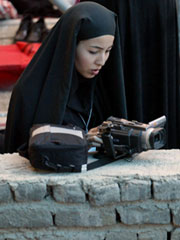New York, April 18, 2009–An Iranian court convicted journalist Roxana Saberi of espionage and sentenced her to eight years in prison today following a closed, one-day trial earlier this week, according to international news reports. Her lawyer said he will appeal.
Her father, Reza Saberi, told NPR from Tehran that he was not allowed into the courtroom to hear the verdict.

Saberi, 31, an Iranian-American freelancer, was first detained in January, although no formal charges were disclosed. She told her family that she was initially held for buying a bottle of wine. A spokesman for Iran’s Foreign Ministry said later that Saberi, left, was being detained at Tehran’s Evin Prison for reporting without proper accreditation.
Living in Iran since 2003, Saberi has filed reports for NPR, Fox News, the BBC, and other international news organizations before her press credentials were revoked in 2006 by the Ministry of Culture and Islamic Guidance, which accredits reporters working for foreign news organizations. According to NPR, Saberi continued to file short news items with government permission.
Hassan Haddad, deputy public prosecutor, told the Iranian Students News Agency (ISNA) on April 8 that Saberi had been charged with espionage. “Without press credentials and under the name of being a reporter, she was carrying out espionage activities,” Haddad said. On Monday, Saberi appeared before a Revolutionary Court for a one-day trial that was closed to the public, Iranian judiciary spokesman Alireza Jamshidi told a news conference in Tehran.
More than 10,000 people worldwide have signed a CPJ petition urging that Saberi receive due process and be released as quickly as possible. CPJ presented the petition to the Islamic Republic of Iran’s Permanent Mission to the United Nations in New York in March. The U.S. State Department has also sought Saberi’s release.
Political prisoners are often jailed at Evin Prison. At least two journalists have died there in the last six years amid circumstances that have not been fully explained, CPJ research shows. Omidreza Mirsayafi, a blogger serving a 30-month sentence on a charge of insulting religious figures, died at the prison in March under mysterious circumstances. In July 2003, Iranian-Canadian photojournalist Zahra Kazemi died from a brain hemorrhage that resulted from a beating at Evin Prison. An intelligence agent charged in the killing was acquitted after a flawed trial. Kazemi had been jailed because she took photographs outside the prison.
Iran’s press freedom record is one of the poorest in the region. In addition to Saberi, at least five editors and writers are currently imprisoned in Iran, CPJ research shows. Adnan Hassanpour, editor of the now-defunct Kurdish-Persian weekly Aso in Iran’s northwestern province of Kurdistan, is jailed on charges of espionage and “working for outlawed parties.” Arrested in January 2007, Hassanpour was initially sentenced to death. A court of appeal overturned the death sentence in September 2008.